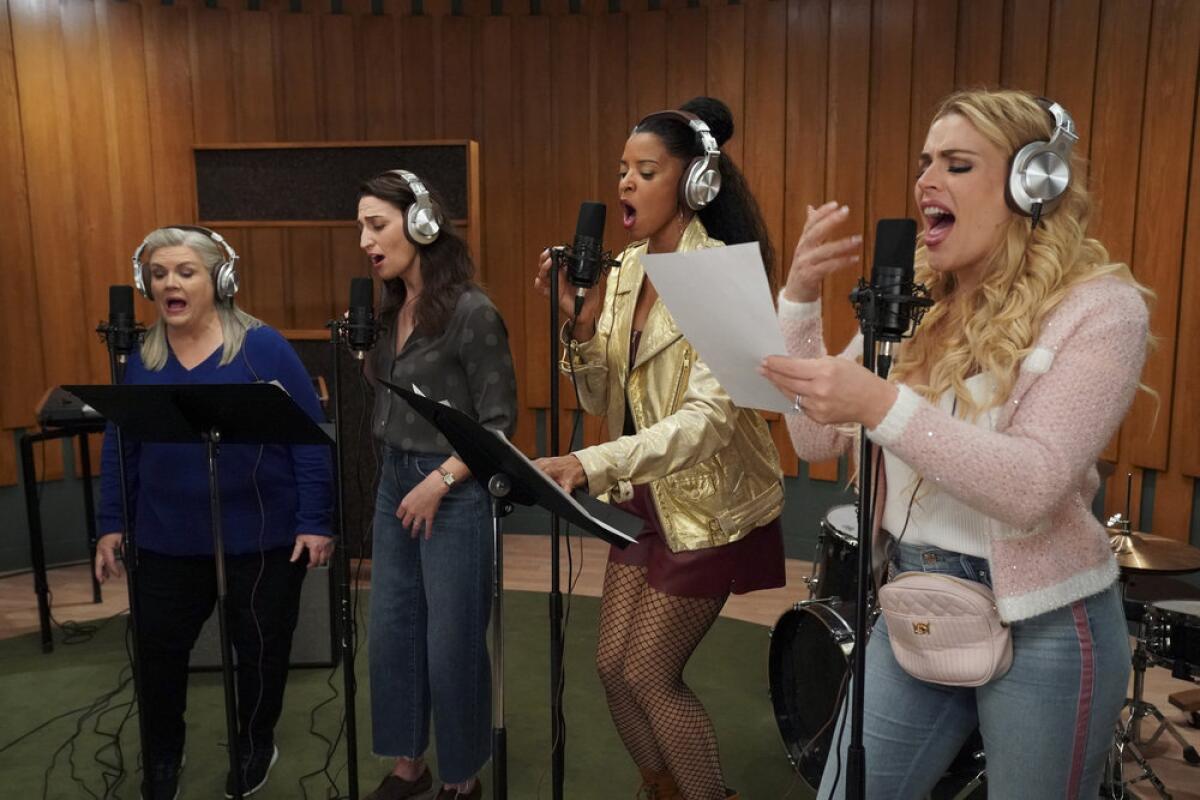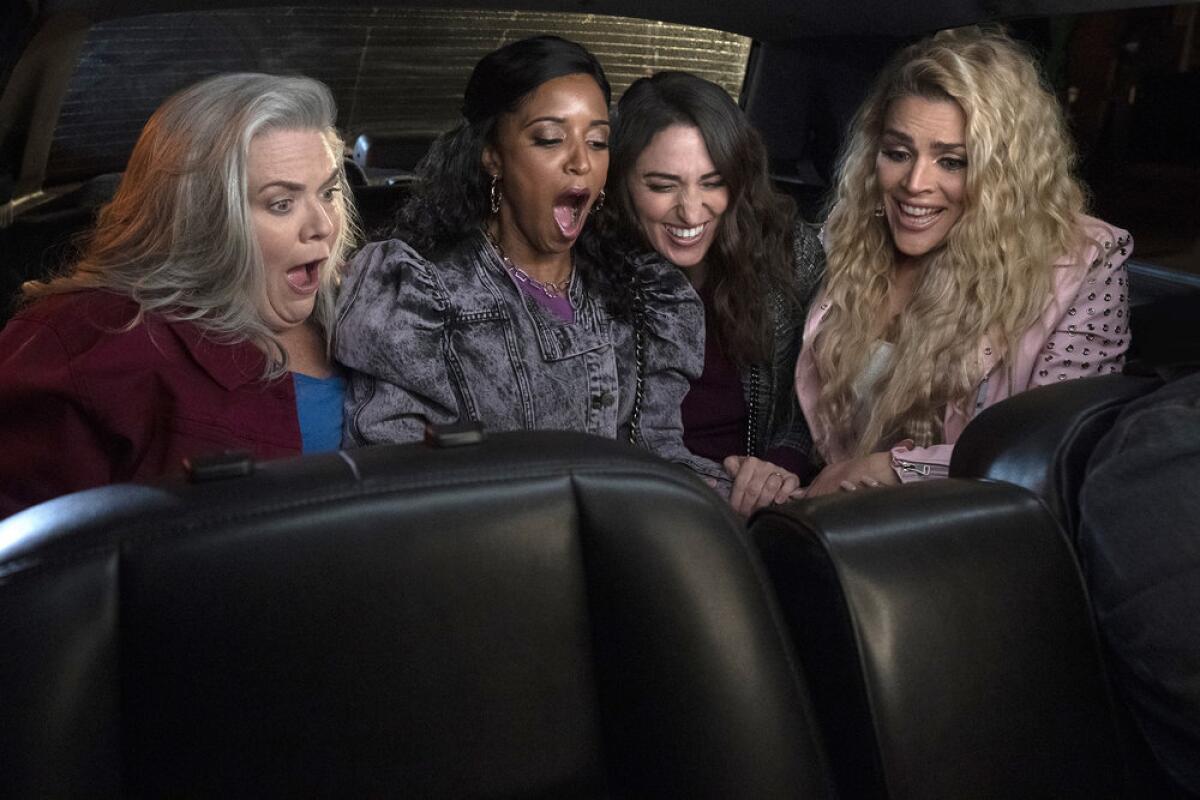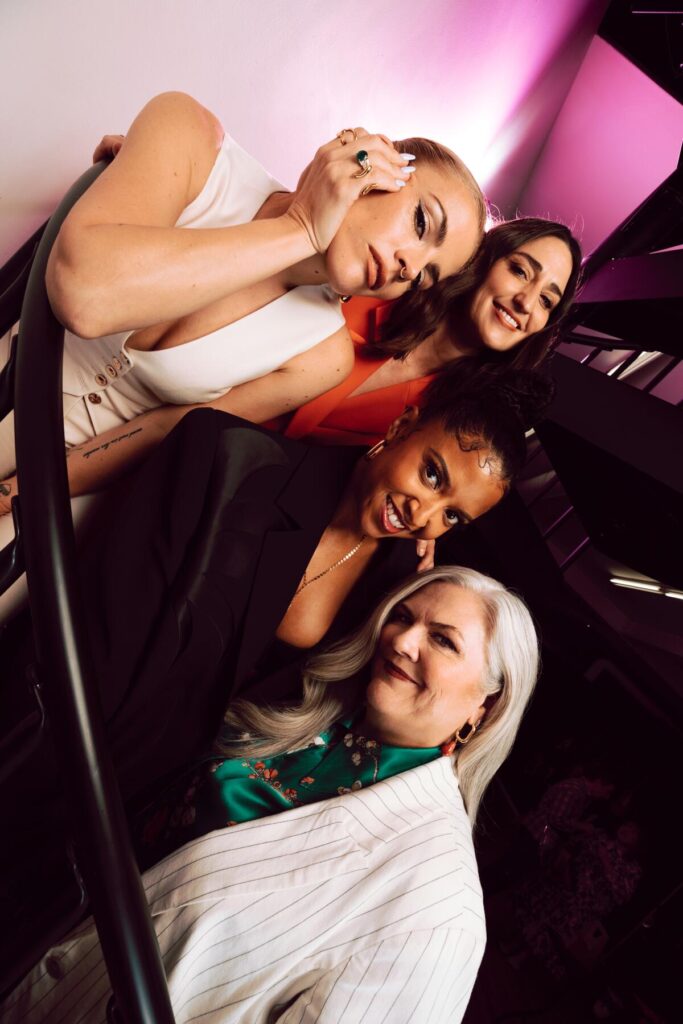Busy Philipps, from top, Sara Bareilles, Renée Elise Goldsberry and Paula Pell star in Netflix’s “Girls5Eva.” “It’s not just the chemistry,” that makes the show work, Goldsberry says of their camaraderie. “It’s the writers’ understanding of who these women are.”
(Annie Noelker / For The Times)
Three seasons in and the reunited-girl-group sitcom “Girls5eva” is singing a righteous truth: The Emmys need an ensemble award. All hail the dynamite alchemy of singer-songwriter Sara Bareilles, actor-writer Paula Pell, actor and sometimes talk show host Busy Philipps and Tony-winning “Hamilton” star Renée Elise Goldsberry as their characters reconcile ambition, personality clashes and showbiz unkindness to live their best second-chance lives.
Even in interview mode after a photo shoot, this superbly cast, gifted foursome shows conversational harmony about any given topic, with warmth, humor and insight on full display. (At one point, Pell and Goldsberry even break into a song from “Fame.”) “It’s not just the chemistry, which we think is amazing,” Goldsberry says of their camaraderie, “it’s the writers’ understanding of who these women are, their rhythms. It feels like an orchestrated score. We all have our own tonal area, but for whatever reason, it works.”
That they clearly dig each other so much seems to mirror how creator-showrunner Meredith Scardino envisioned the arbitrary-family nature of the premise. “Workplace comedies work so well because characters don’t choose to be together at first, they’re thrown together,” Scardino said recently over Zoom. “And now, they would choose each other. They’re real friends. I pinch myself getting to work with them.”
Pell, a respected comedy writer of 30 years, returns the gratitude, saying television is starved for what Scardino has birthed: “To have feelings and deep-hearted, ridiculous, densely intercut, big jokes that have punchlines that make people laugh out loud. We need more of this.”
On what each loves about her character:
Sara Bareilles: My favorite thing about Dawn is that she’s messy. I relate to that so much, the low-grade anxiety, the good intentions but making mistakes. That it’s not all good or bad. Especially this season, I love that she’s clarifying that she really does have this big dream. It’s not just, she wants to write songs. It’s, “I want to shoot for the moon.” I love seeing that in the character. I’m actually in a phase right now, creatively, where I’m trying to loosen the grip of judgment, to kick the editor out of the room a little bit earlier in the process.

Paula Pell, from left, Sara Bareilles, Renée Elise Goldsberry and Busy Philipps star as the reunited girl band in “Girls5eva.”
(Heidi Gutman/Peacock)
Paula Pell: What I love about Gloria is it parallels my personal life, going through my second chance, believing you can have magnificent things happen in your 60s. Women are always told, especially in show business, just put it in neutral and let it coast to the toll bridge. Well, Gloria has that thing of making up for lost time. I took up acting again, I started doing these things, I got married again and I want to experience it all. That hunger and joy.
Renée Elise Goldsberry: I’m a perfectionist and tremendously self-aware. “Is this right? Is my motive correct?” That’s me. Wickie is pedal to the metal. Literally the opposite. She has a high standard but going somewhere is the point. “I booked Radio City Music Hall on Thanksgiving morning.” That’s [my] nightmare. Because it’s so self-involved. We suffer the consequences of that part of Wickie, but because she’s doing it with this group of women, it all ends up working out. It’s how different she is, and that it’s happening at this moment in my life is a miracle.
Busy Philipps: I love Summer’s resilience, her openness, her ability to try. On the surface, it’s a loud, blond, excitable woman who maybe doesn’t have the brightest takeaway, so I have to find the under layer of sadness and depth. I was fascinated by the idea of a person who was stuck at a certain age, in a certain place, and was having just a really difficult time moving forward. Getting to try again for these girls forces Summer to live in the present, as opposed to being able to remain in the fantasy of what it was.

Paula Pell, from left, Renée Elise Goldsberry, Sara Bareilles and Busy Philipps star as a reunited musical group in “Girls5eva.”
(Heidi Gutman / Peacock)
On female solidarity in show business:
Goldsberry: If you’re around this long, the only way you made it is because you did not see another woman as competition, you saw a sister. That’s the formula for surviving this thing. Even if our experiences are different, another woman can look at you and in their eyes it’s, “I’m here. You’re not alone.”
Pell: Now, when there are creators, directors, producers that are female, bringing together genuine female stories, you see the power of it. How much people love it. For years, I’d pitch something and was told, “Would 14-year-old boys like that?” Then “Bridesmaids” happened and those same executives, all they talked about was “I want it to be like ‘Bridesmaids.’” You know what “Bridesmaids” was? About female friendship. And everyone loved it.
Bareilles: It’s making me think about the music industry in particular, though. I’ve had experiences where it was either you can be pitted against this person or not. And I am not competitive in any way at all. I would much rather be in alignment. I do think in music, especially right now, I’m sensing a little regression, which is why it’s great to name it. So I agree with you 1,000%. If you want to exist for a long time in this industry, the only way to move forward is to make friends with other powerful, beautiful, creative women.
Philipps: I came up with so many actresses I was constantly testing against, and these girls are still my close friends. The trick society always tries to pull, in every industry, is that there’s only room for one — but there’s room for 17 men. Culturally, we’re all battling that. And I just heard about someone pitching a show about four women and [the response was], “We actually just bought a show about four women.” And that does feel like a bit of a backslide because of the constriction of this industry right now.

